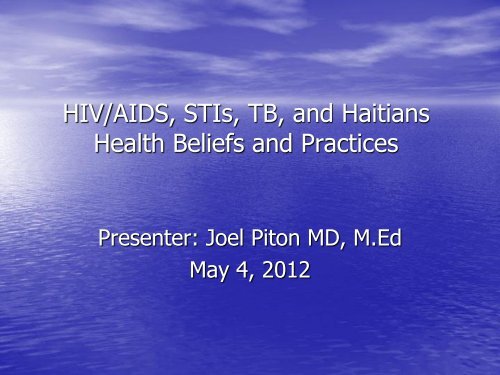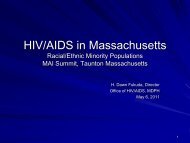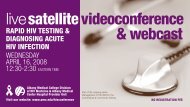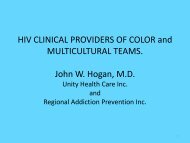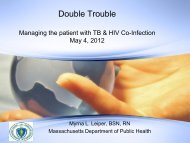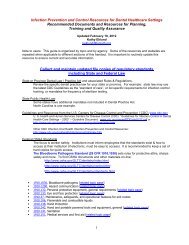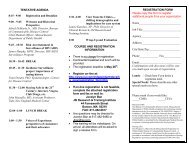Joel Piton, MD, M.Ed Reach Us Project Director Center for ...
Joel Piton, MD, M.Ed Reach Us Project Director Center for ...
Joel Piton, MD, M.Ed Reach Us Project Director Center for ...
Create successful ePaper yourself
Turn your PDF publications into a flip-book with our unique Google optimized e-Paper software.
HIV/AIDS, STIs, TB, and Haitians<br />
Health Beliefs and Practices<br />
Presenter: <strong>Joel</strong> <strong>Piton</strong> <strong>MD</strong>, M.<strong>Ed</strong><br />
May 4, 2012
Outline<br />
• Geographic location of Haiti<br />
• Language<br />
• Religion<br />
• HIV/AIDS & TB rates<br />
• Mental Health<br />
• Health beliefs and practices<br />
• Challenges<br />
• Tips while working with Haitians
Learning Objectives<br />
• Provide a better understanding of some of<br />
the health beliefs and practices among<br />
Haitians<br />
• Explore barriers or challenges you may<br />
encounter while working with this<br />
population<br />
• Discuss some strategies that may assist in<br />
your work with Haitians
Haiti
Haiti<br />
• The least developed country (LDC) in the<br />
region<br />
• Literacy rate 52.9% compared to 99.9 %<br />
in Cuba and 62.1% in the Dominican<br />
Republic<br />
• Life expectancy of 53 compared to 75 in<br />
Cuba and 70 in DR<br />
• Per capita $1,200.00 per year
Geographic Area<br />
• First Black Republic (1/01/1804)<br />
• Haiti shares the Island of Hispaniola with<br />
the Dominican Republic<br />
• Land area: 10,641 sq mi (27,560 sq km)<br />
• Population: 9,598,000<br />
• 10% of the population have some sort of<br />
disability
Religion & Languages<br />
Religion<br />
• Catholicism<br />
• Protestantism<br />
• Voodooism<br />
• Others<br />
Languages<br />
• French<br />
• Haitian Creole
Haitian Culture Health Beliefs<br />
• The Haitian health belief system is one<br />
that consists of several networks of<br />
traditional, mystical, and holistic<br />
approaches to health care<br />
• Effective treatment requires providers who<br />
can navigate between the religions<br />
practices in Haiti and modern medicine
Haitian Culture Health Beliefs<br />
Continuation<br />
In the Haitian belief structure,<br />
diseases may be attributed to both:<br />
• Natural Causes<br />
• Supernatural Causes
Natural Illnesses<br />
• Are known as maladi Bon Dye (diseases of<br />
the Lord)<br />
• Are believed to be of short duration<br />
• Is one with familiar symptoms and a<br />
determinate duration
Supernatural Illnesses<br />
• Appear suddenly, without any previous<br />
signs of discom<strong>for</strong>t<br />
• Is thought by the Haitian to be caused<br />
either by the loa (familial spirit) or by the<br />
dead, curse, spells<br />
• Spirits are thus the prime source of<br />
supernatural illnesses
Degrees of Illness Among Haitians<br />
• I do not feel well “ transitory disturbance”<br />
• I feel sick from time to time<br />
• I am convalescing “recuperating”<br />
• I am sick “ not life threatening”<br />
• I am very sick “ in critical condition”<br />
• I will never be well again “ expect to die”
Haitian Health Care Alternatives<br />
Traditional<br />
Modern<br />
Supernatural<br />
Natural<br />
Public<br />
Physicians<br />
Private<br />
Physicians<br />
Houngan<br />
Mambo<br />
Voodoo Priestess<br />
Mayetizè<br />
Bokò<br />
Fanm Saj<br />
Christian<br />
Catholic Priest<br />
Pastors<br />
Doktè Zo<br />
Pikirist<br />
Docktè Fèy<br />
Chalatan<br />
Mayetizè<br />
J. <strong>Piton</strong>, M.D.
HIV/AIDS and TB in Haiti<br />
• Haiti has one of the highest rates in the<br />
Caribbean. The rate has declined from 5.<br />
9% in 1996 to 2.2% in recent years<br />
• Estimated population living with HIV/AIDS<br />
was 120,000 in 2007<br />
• Percentage of HIV infected people<br />
receiving Antiretroviral Therapy was 61%<br />
2009
Tuberculosis<br />
• In 2007, the estimated incidence <strong>for</strong> all<br />
<strong>for</strong>ms of TB disease in Haiti was 306<br />
cases/100,000<br />
• The WHO estimates that 23% of new TB<br />
patients in Haiti are co-infected with HIV.
Impact of the Earthquake<br />
• More than 200,000 deaths<br />
• More than 7000 deaths due to cholera and<br />
the infection continues to spread across<br />
the country<br />
• No long term plan to address the problem<br />
of cholera
Background<br />
• Boston’s HAITIAN community continues<br />
to be one of the city’s fastest growing<br />
ethnic communities.<br />
• The Massachusetts Department of Public<br />
Health (<strong>MD</strong>PH) estimates that there are<br />
45,000 Haitians living in the city of<br />
Boston, with some statewide estimates as<br />
high as 80,000 (<strong>MD</strong>PH, 1998).
Historical Context of HIV<br />
• Identified in the early 1980s by CDC as<br />
“4Hs”<br />
• Homosexuals<br />
• Heroin drugs users<br />
• Hemophiliacs<br />
• Haitians
Boston’s Haitian Community<br />
• Haitians comprise
A glimpse on HIV Cases diagnosed from<br />
2003-2005 in Massachusetts<br />
Haiti 17% N=129<br />
Brazil 10% N=72<br />
Dominican Republic 7% N=55<br />
Uganda 6% N=44<br />
Kenya 5% N=40<br />
Source: <strong>MD</strong>PH
Tuberculosis Rate in Boston<br />
• Mattapan has the highest rate followed by<br />
South Dorchester, then North Dorchester<br />
• Foreign born patients represent almost<br />
70% of all TB cases in MA<br />
• People from the Caribbean have the third<br />
highest rate<br />
• Mattapan and Dorchester are the primary<br />
locations where Haitians live.
Mental Illnesses<br />
• Mental illnesses usually are perceived to be of<br />
supernatural causes<br />
• Access and exposure to traditional mental health<br />
services in Haiti is virtually non-existent<br />
• There are only 23 psychiatrist working in Haiti<br />
• 7 in the public sector and the remaining in the<br />
private one<br />
• Cap Haitian-the second largest city of Haiti does<br />
not have a psychiatrist doctor<br />
• Only 1% of the government’s budget goes to<br />
medical care
Continuation<br />
• There is strong stigma attached to mental<br />
illnesses<br />
• Mental illness can be the result of a spell or<br />
curse<br />
• Psychiatric disorders unless they give raise to<br />
gross social disturbances are of minor practical<br />
importance<br />
• Unless the individual exhibit behaviors patterns<br />
that put the public at risk. It will not be<br />
addressed
Continuation<br />
• There is tremendous shame attached to<br />
mental illness<br />
• The impact of the earthquake has further<br />
exacerbated the mental needs of the<br />
Haitian community back home & in the US<br />
• The earthquake has changed the way<br />
people see mental health and mental<br />
illness in terms of awareness
Common Health Beliefs & Practices<br />
• TB is the disease of the poor<br />
• Malnourished people are the ones who get TB<br />
• TB and AIDS can be caused by spell and are<br />
both highly stigmatized<br />
• BCG vaccine causes PPD test to positive<br />
• Obesity is seen as a sign of wealth<br />
• Being thin is seen as unhealthy and economic<br />
hardship
Continuation<br />
• Hot and cold theory as an explanation <strong>for</strong><br />
contracting some diseases such as:<br />
– Pneumonia<br />
– Gonorrhea<br />
– Tuberculosis<br />
– Arthritis<br />
• Sickness is when you have signs and symptoms<br />
• TB infection vs. TB disease is hard to grasp
Continuation<br />
• Fatalistic view: God is on charge<br />
• Prefer syrup over pills<br />
• Try home remedies first or in combination<br />
with prescribed medication<br />
• No history of disease prevention and<br />
screening<br />
• Share prescription drugs<br />
• Time required to build trust
Psychosocial and Economic Factors<br />
• Stress: the every day pills taking is reminder of<br />
their health status<br />
• Side effects<br />
• Mistrust of providers<br />
• Disengagement and non-cooperation due to<br />
racism and stereotypes<br />
• Language barriers<br />
• Other social determinants of health such as:<br />
poverty, immigration status, housing, lack of<br />
health insurance
Continuation<br />
• Stigma & intra-community stigma<br />
• Ignorance<br />
• Denial<br />
• Mistrust among providers and community<br />
members<br />
• Financial and human resources
Expectations in a Medical<br />
Encounter<br />
• Quick diagnosis<br />
• Want to be treated politely<br />
• Physicians are interested in helping them<br />
• Expensive prescriptions are better than<br />
inexpensive ones.<br />
• The use of a stethoscope
Lesson Learned<br />
• The Messenger has to be credible<br />
• Stay out of political drama back home<br />
• Radio and TV are keys <strong>for</strong> health promotion<br />
• Group <strong>Ed</strong>ucation conducted in their own language works<br />
<strong>for</strong> this community, it provides them with a <strong>for</strong>um to<br />
discuss other pertinent issues affecting their lives<br />
• We did not start at the same level compared to other<br />
ethnic groups, meaning more ef<strong>for</strong>t and time required to<br />
educate this community<br />
• CBOs could play a tremendous role when it comes to<br />
educate marginalized population like the one we are<br />
serving
Lessons Learned Continuation<br />
• Addressing HIVAIDS, STI, and TB required multiple<br />
approaches<br />
• Need to be addressed while addressing other needs that<br />
are vital <strong>for</strong> the individual<br />
• The community have to buy in to it to be effective and<br />
involve different stakeholders<br />
• HIV work required patience and determination<br />
• Human and financial resources<br />
• Dedication and Commitment
Recommendation <strong>for</strong> Health<br />
Promotion<br />
• Know the history and the culture of the<br />
community you are targeting<br />
• Know about pertinent cultural beliefs regarding<br />
cause and treatment of disease<br />
• Role of religion in the patient health<br />
• Effectively utilize community resources<br />
• Meet your target at the level they are at<br />
• Build trust and be consistently consistent<br />
• Aware of ethnic differences
Continuation<br />
• The philosophical basis <strong>for</strong> culturally<br />
mental health service <strong>for</strong> Haitians is<br />
accepting and valuing health and related<br />
disease customs and beliefs held by the<br />
population<br />
• In practice, cultural competence means<br />
providing health services in the manner<br />
best understood and accepted by the<br />
people who receive it.
Conclusion<br />
• This framework gives you a better<br />
understanding about the Haitian community<br />
• This framework also does not account <strong>for</strong> subtle<br />
variations and practices due to subcultures<br />
based on class, education, skin color, and<br />
geographic location<br />
• This framework suggests that the best way to<br />
work with any group is by cultivating trust and<br />
engaging them in the design and<br />
implementation of the interventions
References<br />
• <strong>Center</strong> <strong>for</strong> Community Health, <strong>Ed</strong>ucation &<br />
Research, Inc.<br />
• Haitian Health Institute and Technical<br />
Development Corporation<br />
• Common Vision (The added Burden)<br />
• <strong>MD</strong>PH<br />
• Michel Laguerre<br />
• BPHC


